Biggest CCPA Fines and Penalties Explained
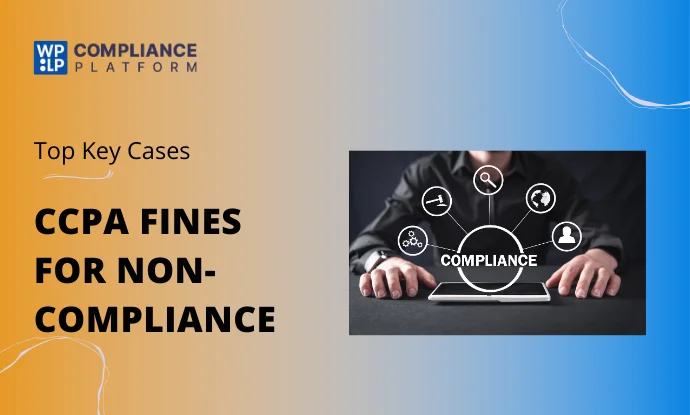
Some of the biggest CCPA fines happen when your website doesn’t comply with the law.
On November 28, 2019, the state of California passed the California Consumer Privacy Act (CCPA). This legislation was to strengthen the protection of consumer data.
The enactment gives individual residents the right to control specific types of their personal data:
- How are they going to make use of the data
- Whether they are going to sell it out to any third parties.
Companies have the responsibility to inform their customers about their potential entitlements. They need to explain the data collected and the purpose of such collection sufficiently.
In this guide, we’ll show you examples of a few top CCPA fines that companies have faced and will provide a list of tips that will help avoid the fines.
What is CCPA?
The California Consumer Privacy Act is a statewide data privacy law signed into effect in California to enforce higher privacy rights and consumer protection for its residents.
California enacted it in 2018, and it came into effect on January 1, 2020, giving residents more control over their personal data and imposing specific obligations on businesses regarding that data.
Main Determinants of the CCPA
The CCPA demands that businesses respond to requests within a reasonable amount of time. If they don’t, then they will be liable for hefty CCPA fines. The laws outlined below bind California residents:
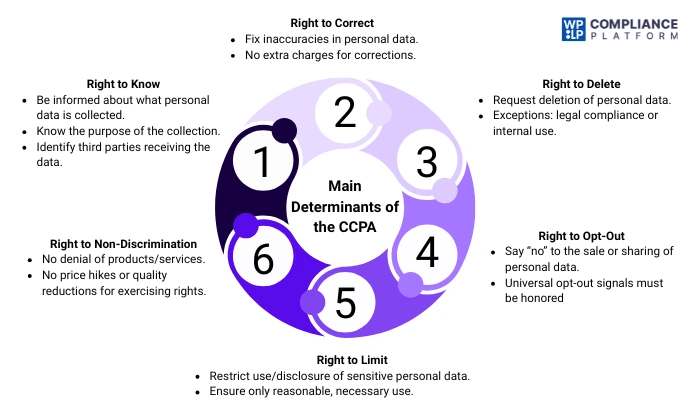
1. Right to Know
Consumers are entitled to be notified about the kinds of personal information being collected. The sources of the information such as:
- The reason for the collection of such information.
- The identity of any third party to whom such information is expected
This source should be provided or sold to avoid fines under CCPA.
2. Right to Correct
Consumers can request corrections to inaccuracies in their personal data, and businesses must make those corrections without charging them extra.
3. Right to Delete
There are limited circumstances in which information must be retained for legal compliance reasons. For internal use, consumers are entitled to request the erasure of their personal information from business records.
4. Right to Opt Out
The law grants consumers the right above the rest to opt out of the sale or share their personal data. If the consumer opts out of availability, businesses also do not sell/share his/her personal data. They will have to pay fines under the CCPA. For this purpose, they can also apply universal equivalent opt-out signals.
5. Right to limit
As for the plans, CCPA has no opt-in system in regard to the use of sensitive data. Rather, this gives consumers the right to limit the use and disclosure of sensitive data to a reasonable extent.
6. Right to non-discrimination
In California, the CCPA protects individual consumers from any type of discrimination. This includes being denied products or services, facing higher prices, or receiving lower-quality offerings.
Who is Required to Comply with the CCPA?
The Californian privacy law focuses on imposing CCPA fines on those for-profit establishments that fulfill the following conditions:
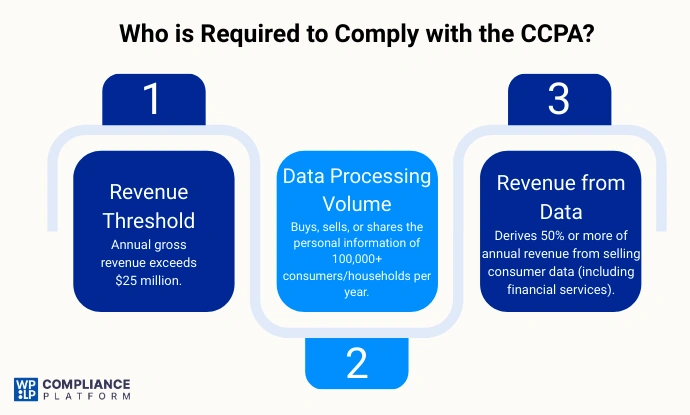
- The business has a gross turnover of more than $25 million in a year.
- The business engages in purchasing/selling/sharing the P.I of over 100,000 individuals
- The business generates a substantial amount of its revenue (over 50%) from the sale of financial services to consumers.
It is the most recent amendment of the CCPA that modified the limit to S138A. The threshold for buying, selling, or sharing personal information has increased from 50,000 to 100,000 people.
The provisions of the statute of CCPA, however, do not extend to non-profit groups and public sector authorities.
CCPA Non-Compliance Penalties
The law regulating the enforcement of the CCPA is the California Attorney General and the California Privacy Protection Agency (CPPA).
The civil CCPA fines range from $2,663 to $7,988 for each violation. Compared to the General Data Protection Regulation’s (GDPR) sanction, this figure may appear to be low. Although it could easily range from thousands to millions, depending on the number of people violated.
Furthermore, the California statute also gives consumers a limited private right of action. They may bring an action against businesses for such acts as the release of data that has been encrypted. The court awards damages ranging from $107 to $799 per person per incident or based on the actual harm suffered.
A restraining order or declaratory judgment, or such further relief that the court may deem appropriate.
The enforcement agency now has the authority to decide whether to allow businesses an opportunity to cure violations. The mandatory 30-day cure period has been removed, and the CPPA now has sole discretion to grant cure opportunities.
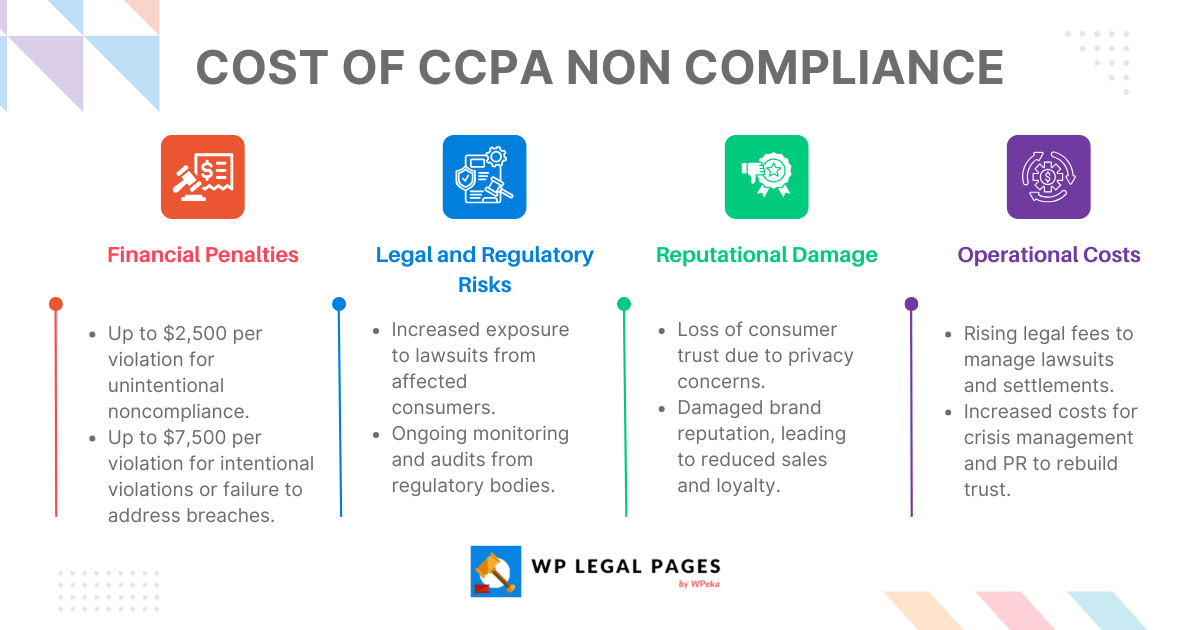
Role of the California Privacy Protection Agency (CPPA)
The CPPA was established in July 2020. This was after the passing of Proposition 24, which was responsible for the California Privacy Rights Act in 2020.
It is made up of 5 board members who are responsible for the regulation and monitoring of the profitability of business that uses or trade California residents’ data.
Any person who is of the opinion that his or her privacy rights have been infringement may file a complaint with the CPPA.
The CPPA, however, does not aggregate and promote the interests of the consumers, nor does it offer to represent consumers in legal actions as their lawyers.
Instead, it gets such complaints, with some conditions requiring that the complaint must concern a breach of the California Privacy Rights Act, only for the purposes of enforcing legislation against the violators.
Specific tasks of the CPPA include
- Public Education: Promoting awareness about privacy rights, responsibilities, and risks.
- Advice: Providing guidance to establishments and consumers about issues regarding privacy, cybersecurity, and automated decision-making.
- Enforcing the Delete Act: Making sure data brokers exhibit compliance with additional privacy requirements.
- Rule Development: CPPA, via rulemaking processes done under the Administrative Procedures Act, has the authority to create and amend regulations.
Top CCPA Fines for Non-Compliance with Real Cases
The following are five examples from real life of companies penalized under privacy laws such as the CPRA and CCPA for violations similar to those present in the examples you provided:
1. Sephora – Unauthorized Sale of Personal Data

Violation: Make-up brand Sephora CCPA fine amounts to $1.2 million for not informing users about the sale of their personal information to third parties like ad companies and analytics. They used third-party tracking, making their actions fit into selling under the CCPA. Also, did not follow the commands of Global Privacy Control to prevent such sales.
Key Takeaway: Data transparency and compliance with data sales disclosures and opt-out mechanisms have to be ensured by the enterprises.
2. CVS Health – Not Supporting Consumer Rights Requests

Violation: CVS Health was taken to task for privacy violations, as consumers complained of problems faced while trying to access and delete their personal information. Failure to provide an adequate response to data subject requests is an infringement of consumer rights under CCPA.
Key Takeaway: There ought to exist a concrete mechanism for companies to work on the management of requests by customers with ease.
3. Meta (Facebook) – Unauthorized Use of Personal Data

Violation: The EU fines Meta Platforms over $1 billion under GDPR; while not directly relevant to CCPA, it proves the same principles. Facebook used consumer data for ad targeting without proper consent, violating transparency and consent provisions.
Key Takeaway: Obtaining ”clear” opt-in consent to data use is central to avoiding regulatory CCPA fines.
4. Honda – Obstructing Consumer Privacy Rights ($630K+)

Violation: The CPPA fined Honda $630,000 in early 2025 for making it as difficult as possible for California consumers to opt out of data sharing, authorizing agents on behalf of the customers, and sharing consumers’ data without contracts. Honda is required to address user privacy flows, improve its user experience, train its privacy staff, and update its contracts.
Key Takeaway: Simple, user-friendly privacy request mechanisms are mandatory, and businesses retain full responsibility regardless of the tools used.
5. Todd Snyder, Inc. – Opt-Out Failures and Excessive Verification ($345K)

Violation: Todd Snyder was fined $345,178 in May 2025 for having misconfigured privacy tools, 40-day delay to opt out requests, requiring sensitive verification to much higher than necessary levels (photo ID), and ignoring the Global Privacy Control signal.
Key Takeaway: Businesses must audit privacy infrastructure, honor preference signals, and remove unnecessary verification barriers.
6. Jerico Pictures, Inc. (National Public Data) – Delete Act Violation ($46K)

Violation: A Florida data broker was penalized $46,000 in early 2025 for registering 230 days late under the Delete Act. Compliance is required even when contacted by CPPA.
Key Takeaway: Timely registration and compliance with the Delete Act are enforceable and non-negotiable.
Each of these cases exhibits the importance of compliance with the privacy laws regarding cybersecurity, strong transparency, and consumer rights. These examples alarm parties that failing to meet CCPA requirements will result in severe CCPA fines and reputational setbacks.
Factors Contributing to CCPA Fines and Penalties
The CCPA sets the contours for determining fines in cases where a company does not comply, while considering the factors that are likely to impact the penalty a firm would have been subjected to. Such factors then ensure that fines are not given out disproportionately to the nature and seriousness of the violation. Below are the salient factors that will determine CCPA fines:
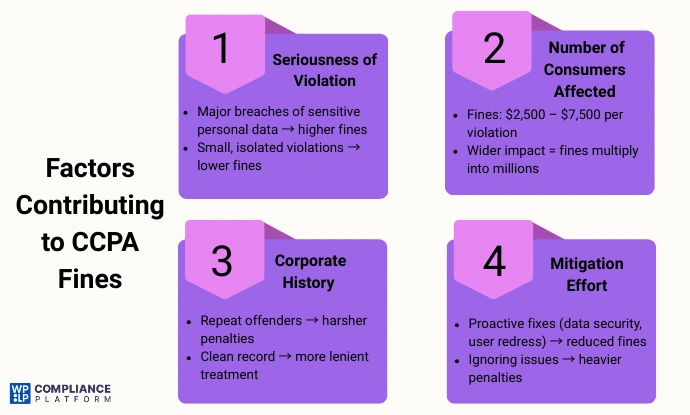
1. How Serious is the Violation
The seriousness of a violation is a cornerstone in calculating the amount of money assessed in CCPA fines.
Violations that leave sensitive personal information vulnerable to the possibility of misuse by many consumers tend to be a lot more serious and incurable.
For instance, authorities will inflict higher CCPA fines for large-scale data breaches or continued contravention of consumer rights than for small isolated violations.
2. How Many Situation Reports Were Affected by the Violation?
Serious violations aimed at many consumers automatically trigger high CCPA fines against them.
Yet, the CCPA fine amount usually differs from $2,500 to $7,500 for one single violation; therefore, several violators end up stopping at the award level, which continues to rise progressively.
If, for instance, the violator affects a considerable number of consumers, the CCPA fines, within no time, multiply beyond that into millions.
For example, a data breach affecting hundreds of thousands of individuals could see a massively larger ticket issued than a breach affecting only a handful of people.
3. Corporate History and Recidivist Offending
The final analysis also weighs a corporate history of privacy law compliance. In case of a long history of violations in quick succession, heightened CCPA fines would await the public corporation on this count.
Put simply, a clean compliance record ensures they can expect lenient treatment. The punishment schedule also varies with the CCPA depending on whether a given violation is chronic or merely singular.
4. Mitigation Efforts
Mitigation efforts refer to what a business does to remedy a contravention or counter a loss.
Companies that take proactive steps to counter a contravention, such as improving data security or providing redress to affected users, could see reduced CCPA fines.
On the contrary, companies that fail to undertake mitigation or do not make an effort to prevent future violations will probably face graver CCPA fines.
The CCPA breach fines compel a baleful inspection of the factors in assessing the fine. It is also necessary to commit to the values of consumer privacy and carry on with a prevention analysis.
The category of offenses deemed possible, the number of identifiable persons, corporate history, and business mitigation all determine the pigeonhole under which a fine would weigh against a company under CCPA.
CCPA vs GDPR Fine Comparison
While both the California Consumer Privacy Act (CCPA/CPRA) and the General Data Protection Regulation (GDPR) focus on data protection and consumer rights, the scale of fines under these two laws is very different.
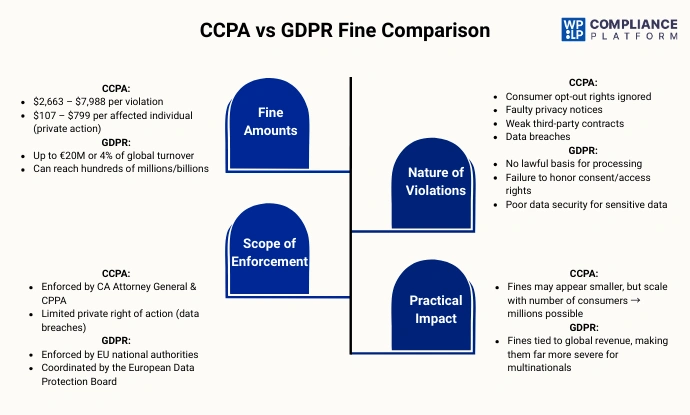
Fine Amounts
- CCPA: The civil penalties for CCPA violations range from a minimum of $2,663 to a maximum of $7,988 per violation (as of 2025) plus any statutory damages that may be assessed in any private action of $107 to $799 for each affected individual. The amount assessed depends on whether the violation was intentional.
- GDPR: Penalty fines can be up to €20 million or 4% of the annual global turnover, whichever is greater. This means that GDPR penalties can easily total hundreds of millions or billions of dollars in penalties for global enterprises.
Scope of Enforcement
- CCPA: Enforcement is led by the California Attorney General and the California Privacy Protection Agency (CPPA). The law also allows limited private rights of action in cases of data breaches.
- GDPR: Enforcement is handled by national supervisory authorities across EU member states, with cooperation through the European Data Protection Board.
Nature of Violations
- CCPA: Fines usually target violations of consumer opt-out rights, improper privacy notices, weak contractual provisions with third parties, or data breaches exposing personal information.
- GDPR: Fines generally target major breaches of personal data, not having lawful bases to process, insufficient security measures for sensitive data, and failure to honour user consent or access rights to personal information.
Practical Impact
- The CCPA may seem like a low fine. However, if thousands of consumers are affected, the fines add up quickly.
- Under GDPR, penalties are much more severe because they are based on global revenue and thus more notable, considering multinational companies.
Difference Between Administrative and Civil Penalties
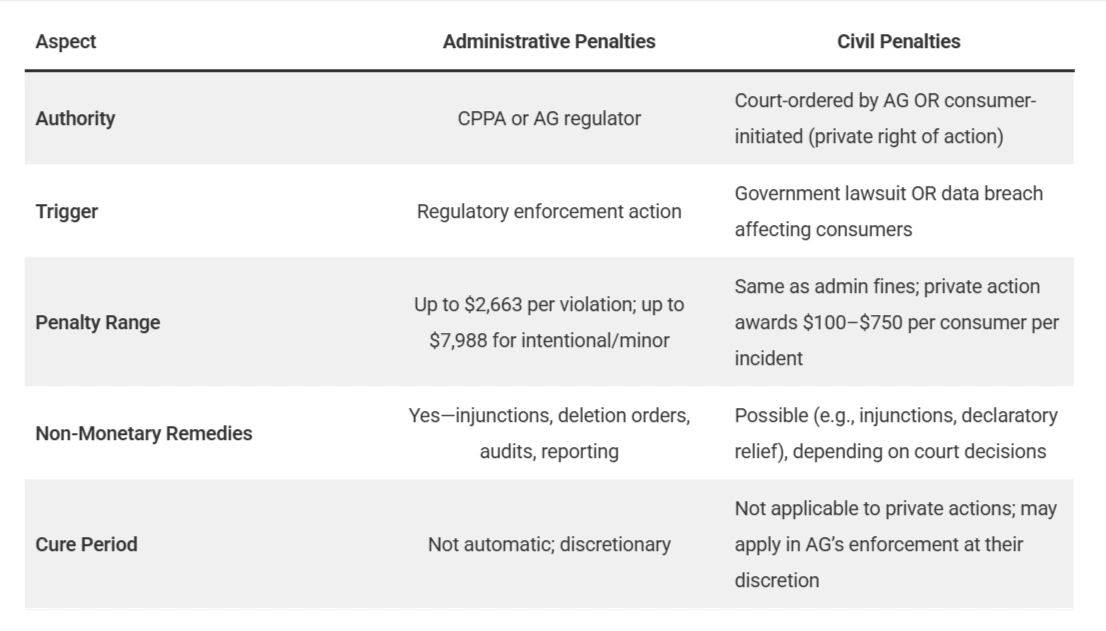
How Companies Can Avoid CCPA Fines
Continuous vigilance in data processing and adherence to CCPA regulations are quintessential for avoiding further liabilities to the business through CCPA fines and enforcement actions.
A complete checklist for your CCPA compliance efforts to avoid CCPA fines and penalties.
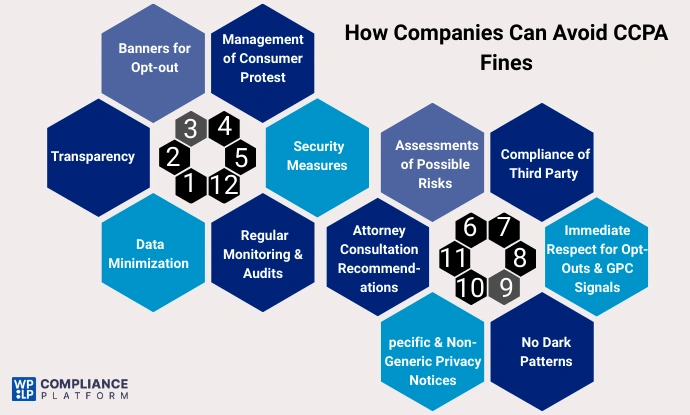
1. Data Minimization and Purpose Limitation
- Collect What’s Necessary: This segment prescribes that the collection of personal data should be limited to the needs of the specific target or a certain use of such collection processes that have been disclosed.
- Use Data Responsibly: The data should remain within the scope of the purposes for which it was collected and shall not be repurposed by the entity without appropriate disclosures.
- Evaluate Your Needs: In this case, you will have to analyze the types of personal data that need to be collected and why it is considered necessary in the course of compliance.
2. Transparency
Make clear and readily available notices to consumers, including:
- Privacy Policy: A highly detailed explanation of how personal data is handled and processed. It is more or less a ‘must’ containing information like what data is collected, how it is used, and what consumers’ rights are.
- Notice of Collection: As briefly as is practical, advisable for legal and best practice compliance, a notice at the point of collection indicating what the information would be used for and in what circumstances.
Both of these documents are of extreme importance, and they must be placed in prominent locations and presented in easily understandable words to the consumers.
Need help creating a traditional PDF privacy policy? Websites like WPLP Compliance Platform are able to automate the tedious and complex procedure of drafting the privacy policy under CCPA with ease.
3. Banners for Opt-out
- Settings for Opt-out Options: If the person is from California, display an opt-out banner automatically. These banners must comply with CCPA provisions by locating the user to General Privacy Control.
- Simplify Compliance: CookieYes simplifies the deployment and implementation of banners, saving time and resources.
4. Management of Consumer Protest
- Provide the Ability to Make the Requests in Different Ways: Provide at least two ways for the consumers to submit the CCPA requests, be it RDP or any deletion request.
- Optimum Reply: All the requests shall be responded to within a period of absolutely no more than 45 days, although the period may be extended up to 45 days. A delay in the notice would be necessary for the consumers with respect to those without, or those that are very complicated or high-volume complaints.
5. Security Measures
- Formulation of Procedures: There should be basic security measures such as encryption, passwords, and regular backups, and compliance with data access control, to prevent unauthorized access to the data.
- Responsibility of Employees: All employees should be trained on best practices in cybersecurity, including identifying phishing or other threats.
6. Assessments of Possible Risks
In order to evaluate the risks of processing data and the measures that can be taken while dealing with the risks, every organization should regularly conduct Data Protection Impact Assessments (DPIAs). Such sets of assessments contribute to the assurance that practices are compliant with legal requirements or other compliance obligations.
7. Compliance of Third Party
- Contracts: The same applies when dealing with a third-party service provider, as you will want to ensure their compliance with CCPA through the contract to avoid CCPA non-compliance penalties.
- Monitoring of Third Parties: Conduct an audit or evaluation on a regular basis on a voluntary basis in order to reduce exposure.
8. Immediate Respect for Opt-Outs & GPC Signals
Act Immediately: Companies must honor opt-out requests and Global Privacy Control (GPC) signals promptly and without delay. This includes ensuring that business systems recognize and can enforce opt-outs automatically.
9. No Dark Patterns
Be Clean: User interfaces should not include tricks to mislead a user into entering consent, for instance, to make opt-outs more difficult to locate, or confuse them into giving away consent. The CCPA enforcement indicates the expectation for a clear design that will not confuse the user.
10. Specific & Non-Generic Privacy Notices
Be Specific: Privacy notices should be clear about how the data will be used, how long it will be retained, and whether it will be shared. Avoid generic or unclear statements, as regulators now penalize a lack of transparency.
11. Attorney Consultation Recommendations
Sometimes it is better to consult a legal expert to understand what is best for your company clearly. In case of consumer lawsuits (private right of action for data breaches), an attorney can help minimize liability and strengthen your legal defense.
12. Regular Monitoring & Audits
Conduct Regular Audits: Ensure that real-world practices implemented internally align with published policies to confirm the absence of inconsistencies. Many enforcement actions commence with gaps between what is written in your privacy notice and what your business actually does.
Streamline Compliance with WPLP Compliance Platform
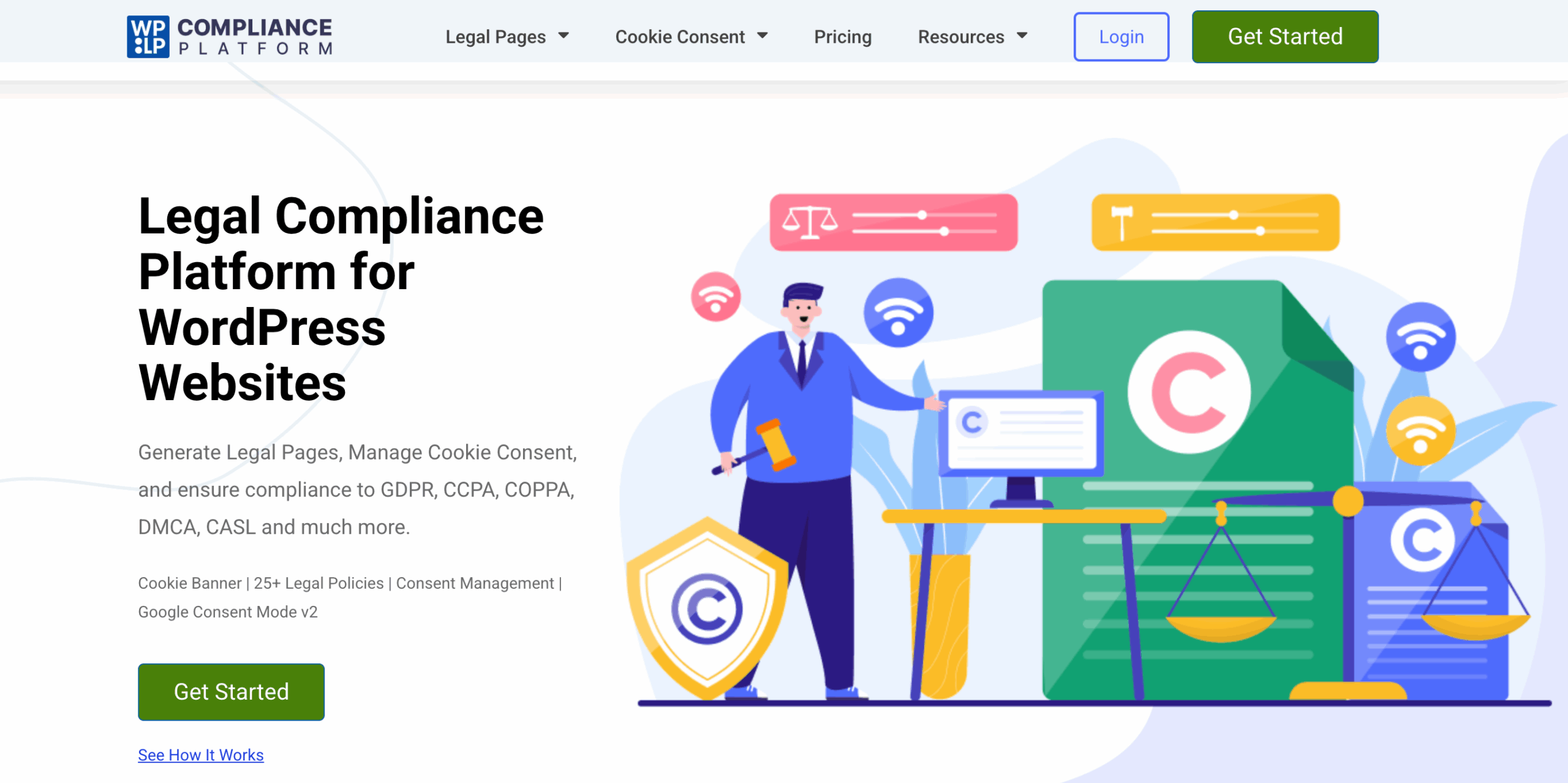
The availability of good tools, like WPLP Compliance Platform, poses mounting challenges to businesses in need of sprouting for CCPA applications.
Since legal documents are essential for the business, such as privacy policies, terms and conditions, and disclaimers, as well as those required by the GDPR, the WP Legal Pages Plugin has done the work easily.
This wizard allows users to effortlessly generate professional and engaging legal documents that can be edited to match the business specifications. As a result, they are more confident in managing compliance requirements such as CCPA.
It is further enhanced by the WPLP’s Consent Manager, which promotes a more holistic experience where visitors are directly targeted but better protected from snooping.
This is a more substantial promise. Both solutions enable businesses to remain compliant and, at the same time, work towards gaining the trust of their clients and target market.
FAQ
Commercial organizations with gross annual income greater than $25 million or those that own the digital data of over 100,000 consumer details or earn 50% or more of their 50% plus gross annual income from the sale of people’s personal data.
The range of CCPA fine amount for the violation of the law is $2,500 to $7,500, and consumers are entitled to sue for data breach as well with CCPA breach fines as compensation.
Invest in compliance solutions that can grow with your business, revise the privacy policies, and obtain the appropriate legal counsel for risk management.
The CPPA assists in enforcing provisions in the CCPA, promotes knowledge around data protection, and assists businesses with any data protection issues.
CPRA provided for additional burdens, expanding consumer rights, and the creation of a legal enforcement agency called the California Privacy Protection Agency (CPPA).
Conclusion
Since compliance with privacy laws like CCPA has become part of building trust with clients and protecting businesses, there has to be transparency, respect for consumer rights, and robust data security policies as well.
Adoption of such measures as data minimization, purpose limitation, privacy policies, and opt-out mechanisms can assist businesses in mitigating risks and the likelihood of extreme CCPA fines and penalties, which are enforcement actions.
WPLP Compliance Platform eliminates such practical challenges. They provide easy ways to create the required documents for legal compliance and manage the consents.
Further appealing, in addition to the compliance aspect, is the assurance that this offers the customer regarding your promise to them about their privacy, thereby cementing trust and brand loyalty among your market, avoiding fines under CCPA.
As privacy regulations emerge, a proactive approach is necessary to ensure reliability and save time and energy.
Make compliance investments today to not only fulfill your legal responsibilities but also to protect your image and help your business grow again in a market that is more aware of its privacy settings.
Disclaimer: This article is for informational purposes only and is not legal advice.
If you liked this article, you can also consider reading:
- What Is IAB TCF?
- General Data Protection Regulation (GDPR) Compliance?
- IAB CCPA Compliance Framework.
Are you ready to take the lead in safeguarding data privacy on your website? Grab WPLP Compliance Patform now!
